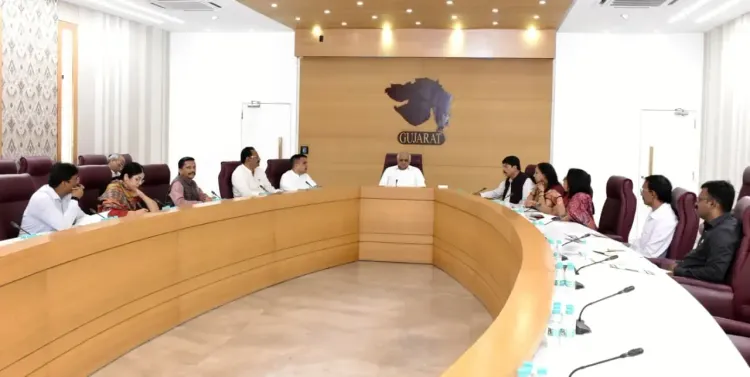How is Gujarat CM Coordinating Efforts to Tackle the Flood Crisis?

Synopsis
Key Takeaways
- Chief Minister Bhupendra Patel is actively assessing crop damage.
- Around 10 lakh hectares of farmland are affected.
- Over 4,800 teams are evaluating crop losses.
- Government is committed to providing timely assistance to farmers.
- The procurement of kharif crops has been delayed.
Gandhinagar, Nov 4 (NationPress) The Chief Minister of Gujarat, Bhupendra Patel, conducted a thorough tour of multiple districts impacted by the recent wave of unexpected rainfall. During his visit, he engaged with farmers in the affected villages to gauge the real situation and comprehend the degree of crop destruction.
After his tour, the Chief Minister convened a high-level review meeting in Gandhinagar to assess the overall circumstances and synchronize relief efforts statewide.
Earlier, Deputy Chief Minister Harsh Sanghvi visited the Surat district, while Agriculture Minister Jitu Vaghani examined the impacted areas in Bhavnagar to evaluate the damage to existing crops.
During the meeting, CM Patel scrutinized reports from various departments and instructed officials to guarantee that farmers receive prompt support and that assessments of crop losses are expedited.
The Chief Minister stressed the need for a rapid and coordinated response to the crisis, reaffirming the state government’s unwavering commitment to assist farmers in their recovery from the effects of the unexpected rains.
The Agriculture Department, in collaboration with other state entities, has initiated an extensive survey of the affected regions.
Thus far, approximately 70 percent of the impacted areas have been surveyed, with officials working tirelessly to finalize the remaining assessments.
Over 4,800 teams are currently involved in evaluating crop losses across 249 talukas and more than 16,000 villages.
Recently, the Gujarat government disclosed that nearly 10 lakh hectares of agricultural land had been impacted by the recent unseasonal rains.
The government has also delayed the procurement of kharif crops—such as moong, soybean, groundnut, and black gram—under the Minimum Support Price (MSP) scheme, which was originally set to commence on November 1.









